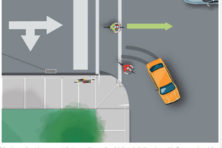Community Marketing Fund Likely to Continue
- Share
- Tweet
- Pin
- Share
One of Door County’s most heated ongoing debates, how to market the Door Peninsula, grew more contentious with the new year.
The Door County Tourism Zone Commission (TZC), the organization that collects and disburses the 5.5 percent county-wide room tax, passed a resolution expressing support for the continuation of the Community Marketing Fund (CMF) Jan. 27.
That CMF, which is set to expire at the end of this year, was created by the TZC in 2009 as a way to bring the City of Sturgeon Bay into the Door County Tourism Zone. The fund is generated from the City of Sturgeon Bay’s 5.5 percent room tax collection. When Sturgeon Bay was wrapped into the TZC, the commission decided to designate the city’s room tax dollars for dispersal back to the municipalities in the zone for individual community marketing, which helped the Sturgeon Bay Visitor Center (SBVC) survive. The SBVC had previously received 70 percent of the city’s then 4 percent room tax.
Many of the individual community business associations are reluctant to let the CMF expire because they’ve incorporated those funds (which totaled $256,000 in 2010) heavily into their marketing efforts.
Communities have used the money to supplement the creation of community brochures and distribution, websites, co-op advertising, and logo development, as well as other marketing efforts.
The TZC’s resolution called the CMF an “essential tool to enable the individual communities to participate in local, regional, and national advertising and marketing efforts that otherwise would not occur,” and created “opportunities for marketing and synergies.”
The resolution states that it is the expectation of the TZC that the CMF program be authorized for 2012 and the years following at $300,000 per year, an amount to be adjusted annually based on actual room tax collections. The resolution suggests that the funds be used in the same manner and activities as the Door County Visitor Bureau (DCVB) marketing budget, that administrative costs associated with the running of the CMF program be absorbed by the DCVB, and that the CMF agencies provide performance information relating to any and all CMF monies to the DCVB.
Asked if the commission’s resolution was binding, Kufrin said that is up to the DCVB Board of Directors to interpret.
“The Tourism Zone Commission has the authority to approve the Door County Visitor Bureau’s budget,” he said. “It’s up to them to decide how they want to respond to the commission.”
Steve Hellman, DCVB president, said he didn’t read the resolution as an ultimatum.
“I think it’s a reasonable expression of what they’re interested in seeing happen,” he said.
Jack Moneypenny, President and CEO of the Door County Visitor Bureau, said he wants the CMF to continue, but at a lower number than the commission proposed.
“I know there is value to the Community Marketing Fund, but there is a big difference between what they’re asking for and what we feel is the right amount,” Moneypenny said. He would not say what he believed the right number to be but said it would be divulged at the DCVB’s monthly board meeting Feb. 15.
Moneypenny also said there should be a sunset of three years on the CMF renewal, after which the program would be reviewed again to assure the funds are being put to good use.
The DCVB board will discuss the CMF at its Feb. 15 meeting, though Hellman said a decision on how to proceed would probably not be made until at least the March meeting.
“Every board member needs to have a say at that February meeting,” Moneypenny said. “Then it would be my preference that they digest the information from that discussion before making a decision.”
The DCVB aims to bring the CMF discussion to a quick resolution because how it’s resolved significantly impacts 2012 marketing planning. A new round of intergovernmental agreements confirming membership in the zone must be in place by the time the visitor bureau gets to the heart of that planning next summer.
Hellman said there are several issues yet to be ironed out, including how the bureau tracks the effectiveness of how CMF money is used.
“The Tourism Zone Commission holds the Visitor Bureau responsible for how all the room tax money is spent, including that doled out in Community Marketing Funds, so those communities have to be responsible to the Visitor Bureau,” Hellman said.
“Personally, I believe that it should continue, that it has been valuable and has been a very important part of holding the Tourism Zone Commission together,” continued Hellman. “But some people feel it should go away as originally planned. We have a tough job ahead of us figuring out how to proceed.”


